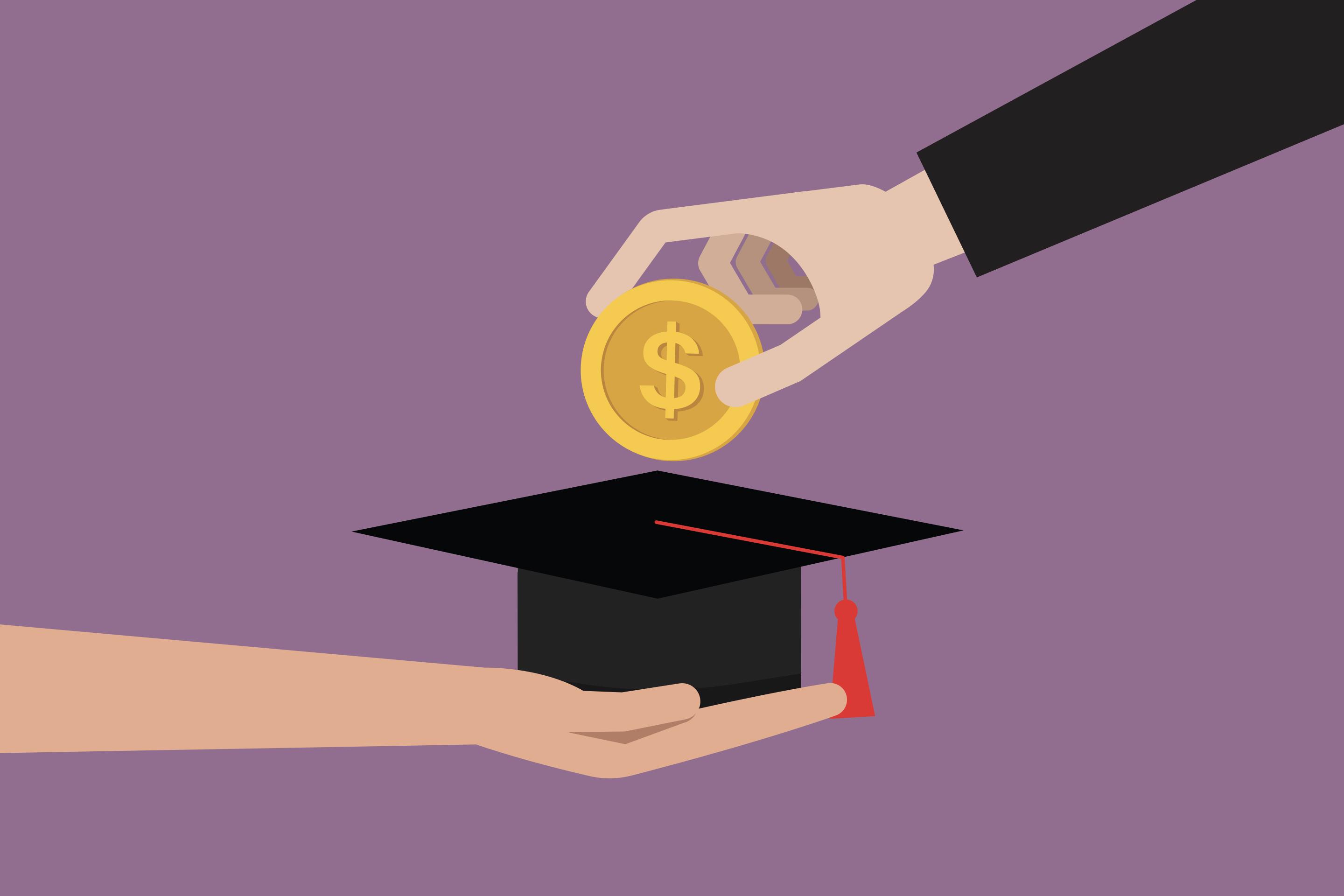Welcome to the ultimate guide on how to navigate the turbulent waters of student loans without succumbing to the perils of financial shipwreck. Let’s face it, there’s nothing quite like the dread of student loans to make you feel like you’re walking a tightrope over a pit of snapping alligators. With terms like “interest rates,” “repayment plans,” and the ever-mysterious “deferment,” it can seem more confusing than trying to solve a Rubik’s Cube blindfolded. But fear not: we’re here to turn those ominous financial storm clouds into a manageable drizzle.
In this article, we’ll break down the concepts, debunk the myths, and arm you with the tools you need to navigate the world of student loans effectively. So grab your compass (or your calculator), and get ready to set sail on a voyage towards financial literacy and, hopefully, a debt-free future. Anchors aweigh!
Understanding Student Loans: Conquering the Beast Without Losing Your Mind
Picture this: you’re about to enter college, armed with dreams and ambitions, when suddenly, a wild student loan appears! Don’t worry; it’s not all doom and gloom. First things first, get to know your loan types. Here’s a quick rundown to make things simpler:
- Federal Loans: The friendly neighborhood loan, often with lower interest rates and more flexible repayment options.
- Private Loans: Your wild card option, usually through banks or credit unions. These can offer higher amounts but often come with higher interest rates.
The next step? Learn the art of repayment. Grab your superhero cape because managing these loans requires some strategy! Consider these tips for a smoother journey:
- Create a budget: Align your income with your expenses and set aside funds for loan payments.
- Pay more than the minimum: If possible, tackle the principal amount faster to reduce interest accumulation.
- Explore loan forgiveness programs: Some careers may offer partial or full loan forgiveness—do your research!

Choosing the Right Loan: It’s Not Tinder, But You Still Have to Swipe Right
When it comes to student loans, you need to do a *little more* research than just a casual swipe right. To find the perfect match, start by identifying the two main types of loans: federal and private. Federal loans usually come with lower interest rates and more flexible repayment options. They also offer a variety of benefits, such as income-driven repayment plans and loan forgiveness programs. On the other hand, private loans can fill in the gaps but often come with higher interest rates and fewer protections. Think of federal loans as your loyal partner and private ones as your unpredictable fling.
Here’s a quick comparison to help you decide:
| Feature | Federal Loans | Private Loans |
|---|---|---|
| Interest Rates | Usually lower | Varies, often higher |
| Repayment Options | Flexible | Limited |
| Borrower Protections | Abundant | Few |
Once you’ve narrowed down your loan options, make sure to read the fine print! Here’s what to look for:
- Interest rates: Are they fixed or variable?
- Repayment terms: When do you start paying back, and how long do you have?
- Fees: Are there origination fees or prepayment penalties?
- Co-signer requirements: Do you need a co-signer, and how will that affect your loan?

Applying for Student Loans: Channel Your Inner Bureaucracy Ninja
Filling out forms and tracking deadlines might not sound fun, but with the right mindset, you can master the art of student loan applications like a true Bureaucracy Ninja. First, create a spreadsheet to track important details such as application deadlines, amounts, and contact information for loan providers. Remember to regularly check your status online and document everything. Bureaucratic mix-ups are real ninjas too, sometimes even vanishing submitted forms mysteriously.
Next, sharpen your ninja skills with some pro tips:
- Keep Copies: Never send any document without making copies. Your future self will thank you.
- Ask Questions: If something is unclear, contact the loan provider. Ninjas may work in the dark, but you don’t have to.
- Stay Organized: Use color-coded folders for physical documents. Digital warriors can use cloud storage with clear naming conventions.
| Loan Type | Interest Rate | Grace Period |
|---|---|---|
| Federal Direct Subsidized | 3.73% | 6 months |
| Federal Direct Unsubsidized | 2.75% | 6 months |
| Private Loans | Varies | Varies |

Repayment Plans: Dodging the Pitfalls and Living Your Best Financial Life
When it comes to paying off those pesky student loans, it’s essential to find the right repayment plan that fits your lifestyle and budget. There are plenty of options, from standard repayment to income-driven plans, and everything in between. Here are a few key choices:
- Standard Repayment Plan: Like taking on a sprint, you’ll finish quickly (10 years), but the monthly payments might leave you breathless.
- Income-Driven Repayment Plans: These are like yoga classes for your wallet – they stretch the payments over 20-25 years, and keep your monthly dues zen and manageable.
- Graduated Repayment Plan: Think of this as the slow-and-steady approach – initial payments start low and increase every two years.
| Plan | Duration | Monthly Payment |
|---|---|---|
| Standard | 10 years | Fixed |
| Income-Driven | 20-25 years | Varies |
| Graduated | 10 years | Increasing |
Choosing the right plan can be a game-changer. It’s like picking your player in a video game; find the best one that helps you win at life, faster and more stylishly. Keep these in mind and avoid the traps: don’t wait until you’re in deep debt lava before switching plans, and certainly don’t ignore those loan servicer emails – they’re not just spam!
Q&A
Q: What are student loans, and why do I need them?
A: Student loans are like those birthday gift cards sans the cake—money you borrow to pay for your education. You need them because, unless your last name is Gates or Bezos, college and university education can be epically expensive. Think of it as an investment in your future, but one that comes with a cute little thing called “interest.”
Q: How do I choose the best student loan for me?
A: Choosing a student loan is like dating. You want to find the perfect match. Federal loans are the real deal—low interest rates and flexible repayment options. Private loans are the bad boys of this universe, often with higher rates and fewer flex options. Always read the fine print to avoid getting turfed by surprise fees.
Q: Should I start repaying my student loans while I’m still in school?
A: Ah, the age-old question: to pay or not to pay? While it’s tempting to defer payments (because Top Ramen doesn’t automatically pay for itself), making even small payments can help you avoid monstrous interest accruals. Remember, future you will thank you for every penny paid now—probably with a future pizza.
Q: What are some strategies to avoid defaulting on my loans?
A: Avoiding default is like avoiding an ex at a party—plan ahead! Set up automatic payments, consider income-driven repayment plans, and don’t ignore any communication from your loan servicer. And when in doubt, ask for help. Financial advisers exist for a reason, and no, they don’t bite.
Q: Can I consolidate my student loans, and should I?
A: Consolidating your loans is basically like turning a chaotic middle school dance into a smooth ballroom waltz. It involves combining multiple loans into one for easy management. It’s handy if you’re dealing with multiple servicers, but be cautious—sometimes this stretches out your repayment period, leading to more interest over time. You don’t want life to be one long Facepalm Friday.
Q: What happens if I can’t pay my student loans on time?
A: If you can’t pay on time, don’t panic—go full McGyver mode instead. Contact your lender; they might offer hardship options like deferment or forbearance. Ignoring payments is the financial equivalent of ignoring a smoke alarm—it’s only going to get louder and more annoying.
Q: Are there any perks to paying off my student loans early?
A: Absolutely! Paying off your student loans early is like finding out the calories in pizza don’t count on Fridays—too good to be true, but it is. You save on interest and get to celebrate your financial freedom sooner. Plus, your credit score will likely do a little happy dance.
Q: What about loan forgiveness programs? How do they work?
A: Loan forgiveness programs are like unicorns—they actually exist and can work wonders. Programs like Public Service Loan Forgiveness (PSLF) or Teacher Loan Forgiveness can erase some (or all) of your debt if you qualify. Usually, this means working in public service for a certain number of years. It’s like the universe’s way of saying, “Thank you for being awesome.”
Q: Any final tips for navigating the world of student loans?
A: Sure! Keep meticulous records, don’t miss deadlines, and always communicate with your loan servicers. Consider student loans like a long-term relationship; it requires attention and effort to keep things smooth. And remember, laughter is the best stress buster. So when all else fails, watch a cat video and breathe—you’ve got this!
Final Thoughts
And there you have it, folks—your crash course in taming the wild, wild west of student loans. Remember, while these financial beasts might seem intimidating at first, armed with the right knowledge and a healthy dose of persistence, you can ride into the sunset of financial stability. Think of yourself as the cowboy (or cowgirl) of your own fiscal frontier, ready to lasso those interest rates and corral monthly payments with panache. So, tighten up your bootstraps, keep that calculator handy, and remember: you’re not just a borrower—you’re a student loans wrangler extraordinaire. Happy trails to you and your budget! 🏇💼🌟


